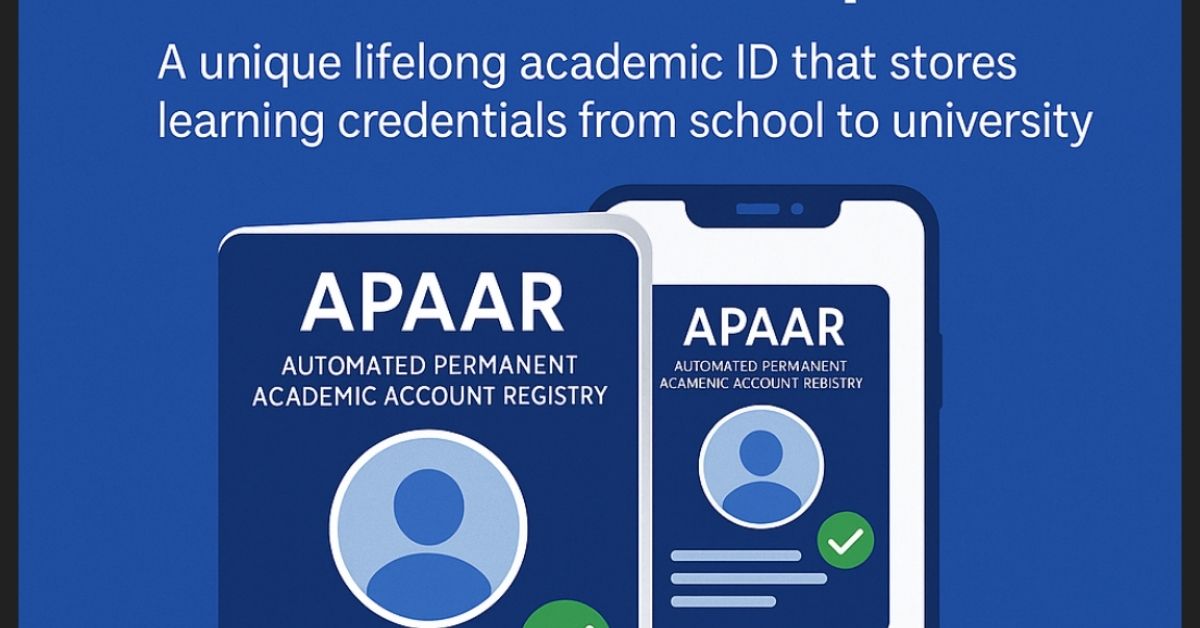A new era of academic mobility has arrived and it’s called APAAR.
Recently, Indian social media has been buzzing with influencers talking about a “Special Academic Passport”, and you may have seen reels, hyping it up with green ticks and serious excitement.
But what exactly is APAAR, and why do influencers call it a game-changer for students…?
🎓 What Is APAAR?
APAAR stands for Automated Permanent Academic Account Registry.
Think of it as a unique lifelong academic ID. A digital passport that will store all your learning credentials from school to higher education, across institutions, states, and even countries.
It’s a central feature of the Indian Government’s National Education Policy (NEP) reforms.
Why It’s Being Called an “Academic Passport”
Much like how your physical passport helps you move between countries, APAAR will help your academic records move across universities and systems. Whether you’re shifting schools in India, applying for university abroad, or pursuing online learning, APAAR will:
✅ Digitally track all your certificates, credits & degrees
✅ Standardise transcripts
✅ Make credit transfers easier
✅ Create a verified profile for future employers or institutions
This is especially big for Indian students dreaming of studying abroad or pursuing hybrid education.
If you’re a NRI student, part of the Indian diaspora, or planning to return to India for higher education, APAAR could simplify how your credentials are accepted across borders.
➡️ No more revalidating transcripts multiple times
➡️ Easy transfer between international and Indian institutions
➡️ Long-term career benefit via digital academic proof
For a deep dive into documentation and visa tips, see our UK-India Student Visa Changes Explained (2025)
Who Is Eligible?
The government is rolling out the APAAR system in phases:
- School students are being issued IDs first via DigiLocker
- College & university students can link their academic records through the National Academic Depository (NAD)
- Future integrations may include professional certifications and skill-based credentials
If you’re currently in Class 9 to university level, you’ll likely be onboarded soon through your educational institution.
Like any major change, APAAR has sparked questions:
🔐 Data Privacy – The government says it complies with data protection guidelines and gives students control over visibility.
📄 Opt-Out Option – Some have raised concerns about it being mandatory. As of now, it’s voluntary, but encouraged for long-term benefits.
🌐 Digital Divide – Implementation might be slower in rural or underserved areas, but digital onboarding via DigiLocker is helping bridge that gap.
Will APAAR Help Me Study Abroad?
Short answer: Not directly, but it can strengthen your applications.
APAAR will give universities abroad a verified and standardised format of your academic record especially useful for visa documentation, credential evaluation, and even job applications.
APAAR is being positioned not just as a policy shift, but as a new cultural touchpoint. It represents India’s push toward digital education, global mobility, and a transparent academic system.
The APAAR Academic Passport isn’t just a document. It’s a step toward making your academic journey borderless, portable, and future-ready.
🎒 Students: Check with your school or college about onboarding.
📲 Parents: Get familiar with DigiLocker.
🌍 Diaspora: Stay updated via the Ministry of Education Portal.
📚 Related Reads on ScottishIndian.com
- UK-India Student Visa Changes Explained (2025)
- Best Student Banks & SIM Cards in Scotland
- Mental Health Support for International Students
📌 Follow @ScottishIndian for updates that matter to our community—from education to immigration and everything in between.






